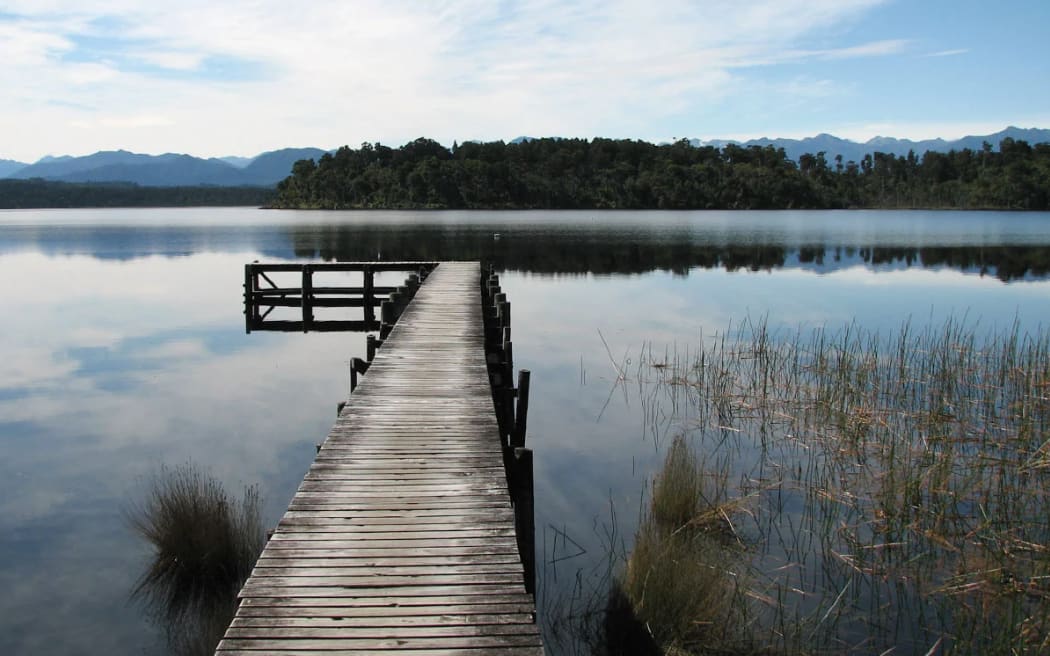
Lake Māhinapua at Shanghai Bay Jetty. Mana whenua in the area have reminded the Te Tai o Poutini Plan committee of the sacred (tapu) status of the picturesque lake. Photo: Supplied / Department of Conservation
A challenge by mana whenua to acknowledge the tapu of Lake Māhinapua near Hokitika has been raised with the Te Tai o Poutini Plan.
The picturesque lake features highly on the West Coast tourist trail.
It includes a highly popular Department of Conservation camping and visitor site and the area has been used for water recreation since the 1900s.
But the lake was the scene of a grisly battle more than 200 years ago with an enduring tapu by mana whenua over the lake itself.
On Tuesday, Tangi Weepu of Poutini mana whenua, fronted the committee to assert that sacred history, after being previously advised he should be making a submission to the TTPP.

"I don't know if you know what happened at the lake; there were people killed out there. A long time ago we put a tapu on the lake - our people are not allowed to swim in there.
"This has been going on for a few hundred years."
Weepu said he had tried to explain this to TTPP chairman Rex Williams, "that it is a cemetery".
He had also relayed to Williams that people lunching on the lake edge were breaking tapu.
In the main, when this significance was explained to visitors including locals they understood and accepted it, Weepu said.
However if the partnership principle of the Treaty of Waitangi had been followed, the sacred status of the lake and recognition of mana whenua's kaitiaki would never have been at issue.
"It's still happening today ... however I believe we start on a new path, that we start implementing the principles of the treaty."
And that should extend to the TTPP process too, Weepu said.
"If we were implementing the treaty properly I should never have to put in a submission."
He also noted the breadth of tapu sites across Te Tai o Poutini and the impracticality of submitting on each one.
"I feel like I'm fighting for my right for my sacred places."
Weepu told the committee it was effectively "my treaty partner".
While there had been submissions on behalf of mana whenua via the Mawhera Incorporation and Te Rūnanga o Ngāti Waewae, those were not necessarily representative.
"I have mana whenua rights; I don't think I should have to put submissions in for sacred places," he said.
Te Rūnanga o Makaawhio chairman Paul Madgwick said what Weepu outlined about Māhinapua "is not wrong".
"It is tapu. We have put certain safeguards in (the TTPP) to protect our Poutini Ngāi Tahu rights."
Ngāi Tahu owned the lake bed and the "special relationship" was acknowledged.
"When it comes to the DOC reserve around the lake, that's another bridge to cross to say, let's pull back the picnic area, because of the tapu of the lake. But it is, the lake is very tapu.
"At the same time we have to recognise 160 years of European use and enjoyment of the lake; the plan very much acknowledges the tapu nature of the lake. It certainly hasn't been ignored; we strongly advocated for that."
Another 260 significant sites along the West Coast had also been entered into the TTPP, under the Sites and Areas of Significance to Māori section following extensive consultation.
"We have not been sitting on our hands for the last four years, we've used this as an opportunity to identify [them]. It's not perfect but it's a darned sight better than what we've got."
Madgwick said the TTPP was "years ahead" than the current three district plans "that didn't even acknowledge Māori sites".
He assured Weepu it was not necessary for him to submit.
"We've got your back on that," he said.
Weepu said for 40 years he had heard from the various government departments administering the Māhinapua visitor sites that "oh, it's enjoyment for the people, justifying that they can carry on what they are doing".
"People should be able to enjoy it - with understanding ... people swim in there and don't even know."
Madgwick noted interpretation panels at the site which gave a picture of that.
Disclosure: Te Rūnanga o Makaawhio chairman Paul Madgwick is also the editor of the Greymouth Star. He took no part in the commissioning, writing or editing of this LDR story.
Local Democracy Reporting is Public Interest Journalism funded through NZ On Air

